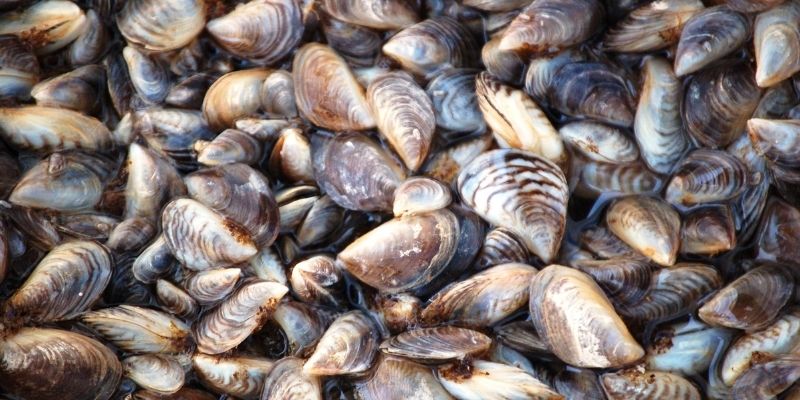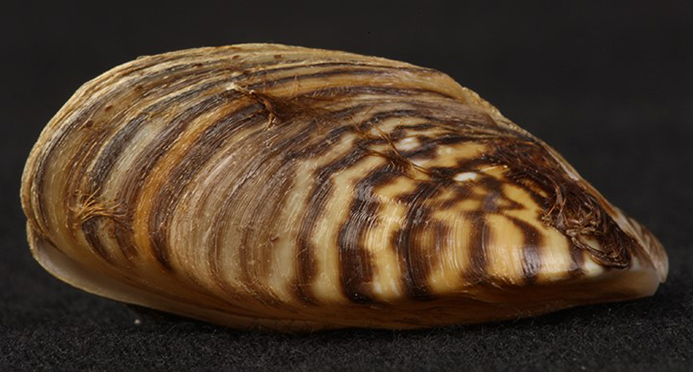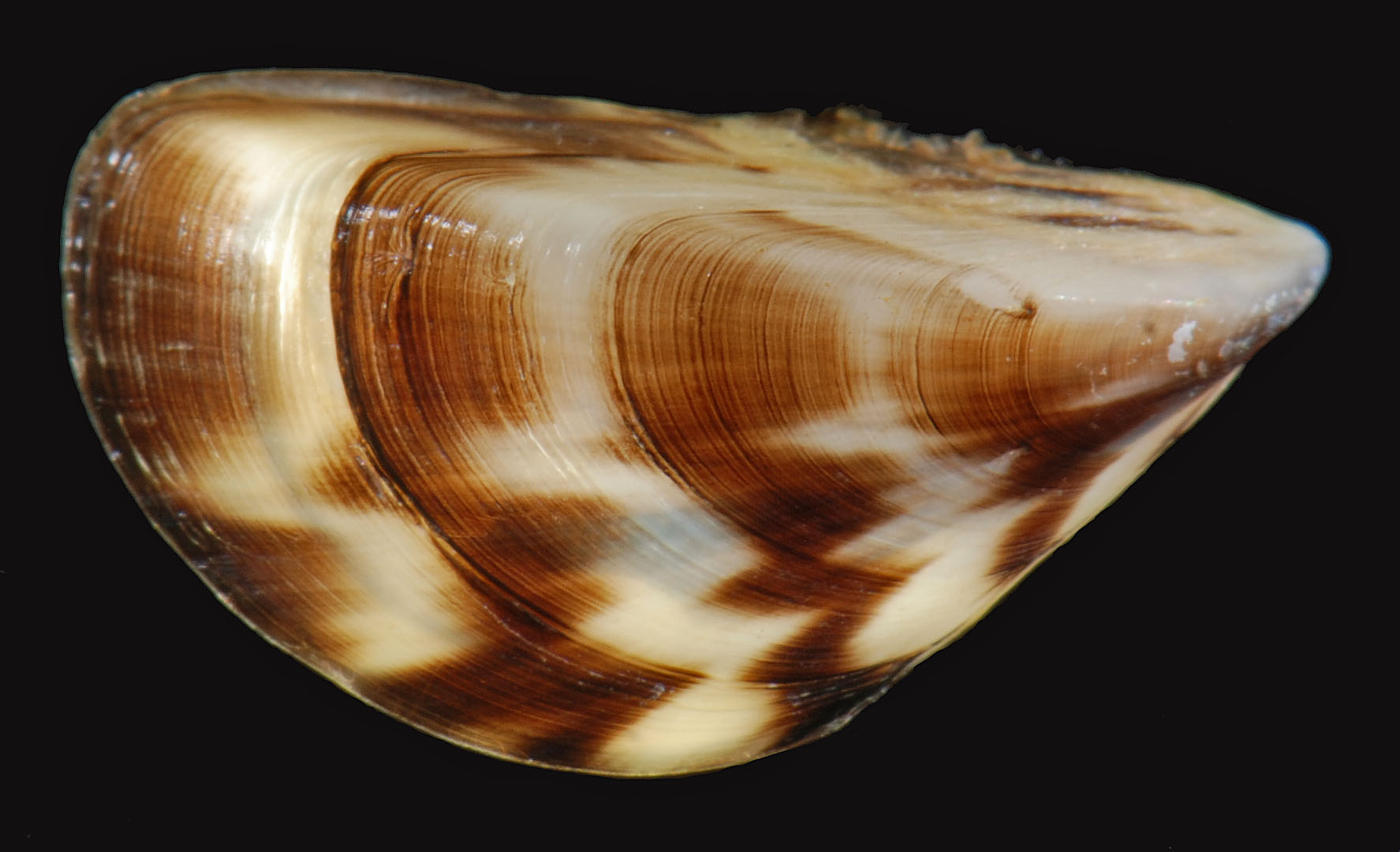Zebra mussels are small, invasive freshwater mollusks. They originate from Eastern Europe and pose ecological threats.
Zebra mussels are a significant concern due to their rapid spread and ecological impact. These tiny mollusks, measuring about an inch, attach themselves to various surfaces, including boats, pipes, and native species. Their presence disrupts local ecosystems by outcompeting native mussels and altering water quality.
Zebra mussels filter water, which can increase water clarity but reduce available food for other aquatic species. Their sharp shells can damage infrastructure and beaches, posing risks to human activities. Effective management and prevention strategies are essential to control their spread and mitigate their environmental and economic impacts. Regular monitoring and public awareness play crucial roles in addressing this invasive species.

Credit: www.eekwi.org
The Origin Of Zebra Mussels
Zebra Mussels are small freshwater mussels with a distinct striped pattern. They are invasive species known for their rapid spread and environmental impact. Understanding their origin helps us grasp how they have become such a problem.
Native Habitats
Zebra Mussels originally come from the lakes and rivers of Eastern Europe. They thrive in the freshwater ecosystems of these regions. Their native range includes the Caspian Sea, Black Sea, and their tributaries.
In their native habitats, natural predators help control their population. This balance prevents them from becoming invasive. The presence of these predators is crucial for maintaining the ecosystem’s health.
Pathways To Invasion
Zebra Mussels have spread far beyond their native habitats. They first arrived in North America in the late 1980s. They likely traveled in the ballast water of ships. Once introduced, they quickly colonized new environments.
Their rapid spread is due to several factors:
- High reproductive rate: Zebra Mussels can produce millions of eggs.
- Attachment capability: They can attach to hard surfaces, including boats.
- Wide environmental tolerance: They can survive in various water conditions.
As a result, they have invaded many lakes and rivers in North America. Their presence causes significant ecological and economic damage.
Efforts to control their spread include cleaning boats and monitoring waterways. Public awareness campaigns also play a role in preventing further invasions.
Identifying Zebra Mussels
Zebra mussels are small, invasive freshwater species causing ecological problems. Identifying zebra mussels is crucial for preventing their spread. This section will help you recognize zebra mussels through their physical traits and habitat preferences.
Physical Characteristics
Zebra mussels have distinct shell patterns. They are usually striped with dark and light bands. The shape of their shell is D-shaped, making them unique.
They are small, typically about 1-2 inches long. Their shells are smooth and can be sharp to touch.
Here is a table summarizing their physical traits:
| Characteristic | Description |
|---|---|
| Shell Pattern | Dark and light stripes |
| Shape | D-shaped |
| Size | 1-2 inches |
| Texture | Smooth but sharp |
Habitat Preferences
Zebra mussels prefer freshwater environments. They thrive in lakes, rivers, and streams. These mussels attach to hard surfaces, including rocks and man-made structures.
Their preferred water temperature ranges from 50°F to 86°F. They are often found in areas with good water flow.
Here are key points about their habitat:
- Freshwater environments
- Attach to hard surfaces
- Temperature: 50°F to 86°F
- Areas with good water flow
Ecological Impact On Waterways
Zebra mussels are small but have a huge ecological impact on waterways. These invasive species can cause serious problems for local ecosystems and biodiversity.
Effects On Local Ecosystems
Zebra mussels filter water to feed, removing plankton. This filtering clears the water, letting sunlight reach deeper layers.
With more sunlight, aquatic plants grow more quickly. This can change the natural balance of the ecosystem.
Native species that rely on plankton for food may struggle. Their numbers can decrease, affecting the entire food chain.
Consequences For Biodiversity
Zebra mussels attach to hard surfaces, including native mussels. They can cover these native species, leading to their suffocation.
Fish and other animals that eat native mussels lose a food source. This impacts their population and the diversity of the ecosystem.
Invasive zebra mussels can outcompete native species for food and habitat. This reduces the variety of life in the waterway.
| Impact | Description |
|---|---|
| Water Clarity | Cleared water affects plant growth and light penetration. |
| Native Species | Struggle for food and habitat due to zebra mussels. |
| Biodiversity | Reduction in variety of species due to competition. |
- Filter Feeding: Removes plankton, affecting food availability.
- Sunlight Penetration: Increases plant growth, disrupting ecosystems.
- Attachment: Covers native mussels, leading to their death.

Credit: wildlifedepartment.com
Economic Ramifications
Zebra mussels have significant economic impacts. They affect various industries and require substantial management efforts. This creates a financial burden for many sectors.
Cost To Industries
Industries face high costs due to zebra mussels. These invasive species clog water intake pipes. This disrupts water supplies for power plants and factories. Cleaning these pipes is expensive and time-consuming. Zebra mussels also damage boats and docks. This leads to repair costs for the boating industry. Fishermen face reduced catches because zebra mussels disrupt aquatic ecosystems.
Management And Control Expenses
Managing zebra mussels involves ongoing expenses. These include monitoring and treatment. Many regions use chemical treatments to control zebra mussel populations. These chemicals are costly and need regular application. Physical removal methods also add to expenses. Authorities deploy divers to remove mussels from structures. This is labor-intensive and costly.
| Expense Category | Details |
|---|---|
| Chemical Treatments | Regular application of costly chemicals |
| Physical Removal | Divers and equipment for manual removal |
| Monitoring | Continuous surveillance of water bodies |
The economic impact of zebra mussels is extensive. Effective management requires significant financial resources.
Combatting The Spread
Combatting the spread of zebra mussels is crucial. These invasive species can damage ecosystems. They also clog water pipes and harm native wildlife. Effective measures are necessary to manage their spread. This section covers key strategies for prevention and control.
Preventative Measures
Preventative measures are the first line of defense against zebra mussels. Boat owners should clean their vessels thoroughly. Follow these steps:
- Inspect boats for attached mussels.
- Remove any visible mussels or aquatic plants.
- Drain water from boats and equipment.
- Wash boats with hot, high-pressure water.
- Dry boats for at least five days before reuse.
Anglers should also be cautious. Use only clean, dry gear. Avoid transferring water from one body to another. These simple actions help prevent the spread.
Removal And Control Strategies
Once zebra mussels invade, removal and control become necessary. Here are some strategies:
- Manual Removal: Hand-scraping or using tools to remove mussels from surfaces.
- Chemical Treatments: Applying approved chemicals to infested areas.
- Biological Controls: Introducing natural predators like certain fish species.
- Physical Barriers: Installing screens or filters in water systems.
Each method has its pros and cons. Manual removal is labor-intensive but effective. Chemical treatments can be harmful to other species. Biological controls require careful monitoring. Physical barriers can be costly but provide long-term solutions.
It’s essential to choose the right strategy. This depends on the specific situation. Combining multiple strategies often yields the best results.

Credit: en.wikipedia.org
Conclusion
Understanding zebra mussels is crucial for environmental preservation. These invasive species harm ecosystems and infrastructure. By staying informed, we can take effective action. Protecting our waterways requires collective efforts and proactive measures. Let’s work together to minimize the impact of zebra mussels and safeguard our natural resources for future generations.
